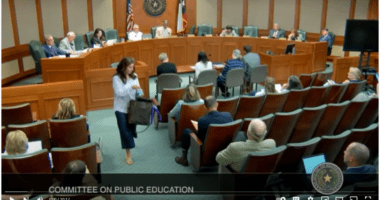Joint Testimony from Texas Education Advocates on edTPA as a Certification Exam for Standard Teacher Certifications
To: State Board for Educator Certification
Re: edTPA as a Certification Exam for Standard Teacher Certification
The Commit Partnership and the co-signed organizations below thank you for the opportunity to submit public comment in support of edTPA as the requirement for standard teacher certification in Texas.
Aligned with SBEC’s core principle that “student success is primary,” our fundamental priority as education advocates is to ensure that Texas students receive an education that prepares them for growth and success. We are appreciative of the Board’s work since 2015 to revisit teacher certification requirements in order to improve teacher quality and ready our educators to meet the needs of all of our state’s students from day one. With thousands of more students now below grade level compared to pre-pandemic levels (results from the 2021 administration of the STAAR test show a 4% decline in reading proficiency and a 15% decline in math), it’s clear that this work is more essential than ever. [1]
In light of this, we ask the Board to strongly consider moving forward with edTPA for the following reasons:
First, we believe that the edTPA sets educators and their students up for success. To ensure educators are well-prepared to be successful in the classroom on day one, candidates should demonstrate a combination of content knowledge and teaching proficiency in that specific content (strong predictors of student achievement). [2] While the current multiple-choice Pedagogy and Professional Responsibilities (PPR) exam required for certification does not address the differences between teaching different subject areas or grade levels, the portfolio-based edTPA asks candidates to demonstrate and self-reflect on content knowledge and instructional skills applied in an authentic way and in alignment to the Texas standards. Ultimately, it better supports candidates by authentically assessing the practical skills teachers need to support strong student performance–planning, instruction, and assessment of student learning– and is a better reflection of teachers’ performance in the classroom. K-12 partners involved in educator preparation acknowledge the value of edTPA in improving educator preparation and teacher readiness in Texas. [3]
Second, the edTPA’s more authentic assessment evaluating candidates’ application of knowledge and skills to the teaching experience will help improve the quality and rigor of educator preparation programs (EPPs) in Texas by encouraging the inclusion of more practice-based training. Raising the bar for EPPs in this way will better prepare educators to stay and thrive in the profession. COVID has, unfortunately, exacerbated the already observable trends of fewer individuals entering the teaching profession and teachers remaining in the classroom for shorter periods of time. Educator candidates, however, who are provided more opportunities for practicing necessary foundational skills not only feel better prepared to teach but also stay in the profession longer. Research shows that candidates who have practice experience before teaching in the classroom full-time are three times less likely to leave after their first year. [4] Every year more teachers are entering the teaching profession in Texas through certification programs that do not allow for clinical experiences that prepare teachers to serve as teachers of record. The edTPA, however, encourages EPPs to offer opportunities for practice with the potential for more clinical teaching time within programs, serves as a tool to drive educator preparation programs’ support for candidate improvement, and is more likely to strengthen the incoming teacher workforce while simultaneously supporting teacher retention. Teacher candidates and interns will learn most from these experiences if they are timed prior to serving as teachers of record.
Although edTPA offers many essential advantages to the current system and aligns well with the SBEC’s Core Principles, we understand that successful implementation of the edTPA will take time. While still in the third year of the pilot, EPPs have seen “growth in their candidates and improvement in their programs” across subjects. In fact, Texas candidates’ mean score of scorable portfolios meaningfully increased from Year 1 to Year 2, following a similar trajectory to what has been seen in edTPA pilots in other states. A proposed implementation timeline with multiple nonconsequential years will provide adequate time for EPPs to prepare and will give TEA and SBEC time to adjust, select a meaningful cut-score based on Texas data, [5] and ensure adequate support for programs and candidates.
Finally, we strongly urge the Board to take into account the following considerations: meaningful supports are necessary and possible for the edTPA to develop a diverse, equitable workforce. To improve outcomes for our state’s diverse student population, it is absolutely critical to have a well-qualified, diverse teacher workforce and a certification exam that does not yield disparate results from under-represented candidates but instead supports the entry of individuals from diverse backgrounds into the profession. In the edTPA pilot, candidate performance across demographic groups actually reached near parity in Year 2 (Black, Hispanic, and White candidates’ mean scores were between 38.2-38.9). 6 Furthermore, a TNTP study found that interviewees “did not notice disparities in participation or completion of the edTPA by race.” [6] Given that there have been more concerning disparities in performance results from other states (e.g., in Washington disparities by race surfaced once the edTPA became consequential) [7] and at the national level, [8] performance data disaggregated by demographic group should be continuously monitored and an ongoing bias review of the assessment in Texas conducted. [9] Additionally, TEA should work to better understand which changes and improvements were made in the second pilot year that supported the performance of candidates of color so that these can be continued and expanded. Already, however, we believe that both of the following supports (which have been highlighted in the TX pilot thus far) [10] are key to ensuring that candidates of color and low-income candidates do not face additional barriers to entry into the profession and are successful both in the certification process and later in the classroom:
- Creative and sustainable cost solutions such as offering additional reimbursements, stipends, and vouchers; integrating expenses into program tuition or financial aid; developing a grant program for licensure assessments; and connecting students with scholarships such as the TEACH grant to pay for tuition and assessments.
- Supports to educator preparation programs and LEAs around edTPA’s integration into their programming such as resources and trainings on equity in relation to the assessment (including clarification around the academic language of the edTPA); recommendations for how best to align program coursework with the assessment (including how to bolster candidates’ writing skillsets); guidance on best-practices for addressing timing pressures experienced by candidates; and tailored strategies for improving candidate performance based on disaggregated student data.
With these supports in place, moving forward with the edTPA as a certification requirement for Standard Teacher Certification in Texas would not diminish the variety of pathways in which talented and diverse candidates can successfully enter the profession. Instead, the certification exam will serve as an upfront investment, ensuring that no matter which pathway is taken all incoming educators have the strong foundation needed to accelerate the student outcomes necessary for our state to not only recover from the pandemic but excel.
Thank you for your time,
Todd Williams
Chairman and CEO, The Commit Partnership
Dottie Smith
President, The Commit Partnership
Additional Supporters:

[1] Texas Education Agency (2021).Overview of 2021 STAAR Results. https://tea.texas.gov/sites/default/files/covid/Overview-of-2021-STAAR-Results.pdf
[2] Goldhaber, D., Cowan, J., & Theobald, R. (2017). Evaluating prospective teachers: Testing the predictive validity of the edTPA. Journal of Teacher Education, 68(4), 377–393. https://doi.org/10.1177/0022487117702582 ; Hill, H. C., Rowan, B., & Ball, D. L. (2005). Effects of teachers’ mathematical knowledge for teaching on student achievement. American Educational Research Journal, 42(2), 317-406.
[3] The New Teacher Project (2020). Texas edTPA Pilot Implementation: Findings and Recommendations.
[4] Ingersoll, R., Merrill, L., & May, H. (2014). What are the effects of teacher education and on beginning teacher attrition? Research Report (#RR-82). Philadelphia: Consortium for Policy Research in Education, University of Pennsylvania. https://www.cpre.org/sites/default/files/researchreport/2018_prepeffects2014.pdf
[5] Given some evidence suggesting that increasing the cut scores for licensure assessments can negatively impact teacher diversity as well as the essential need to maintain a rigorous standard for certification, a slow rollout will allow TEA and SBEC to determine what is best for Texas’ context and diverse student population, all the while ensuring that all candidates experience the process of practice-based learning and receive supports to prepare them to be effective in the classroom. 6 State Board for Educator Certification. (2021). Item 17: Discussion of the edTPA Pilot Updates. https://tea.texas.gov/sites/default/files/agenda-item-17.pdf
[6] The New Teacher Project. (2020). Texas edTPA Pilot Implementation: Findings and Recommendations.
[7] Goldhaber, D., Cowan, J., & Theobald, R. (2017). Evaluating prospective teachers: Testing the predictive validity of the edTPA. Journal of Teacher Education, 68(4), 377–393. https://doi.org/10.1177/0022487117702582
[8] Stanford Center for Assessment, Learning and Equity. (2021). Educative assessment & meaningful support 2019 edTPA administrative report. edTPA. https://secure.aacte.org/apps/rl/resource.php?resid=903&ref=edtpa
[9] For example, Massachusetts engages a bias review committee to advise on licensure assessments. See Cowan, J., Goldhaber, D., Jin, Z., & Theobald, R. (2020). Teacher Licensure Tests: Barrier or Predictive Tool? (CALDER Working Paper No. 245-1020). https://caldercenter.org/publications/teacher-licensure-tests-barrier-or-predictive-tool
[10] See for example, Educate Texas (2021). Texas edTPA Pilot Implementation Challenges and Recommendations. https://www.edtx.org/edprep/research-and-resources/edtpa-community-of-practice


